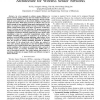158 search results - page 14 / 32 » Distributed Scheduling and Active Queue Management in Wirele... |
IPPS
2005
IEEE
15 years 5 months ago
2005
IEEE
We investigate the problem of maximizing the lifetime of wireless ad hoc and sensor networks. Being battery powered, nodes in such networks have to perform their intended task und...
99
Voted
IJSNET
2006
14 years 11 months ago
2006
: In this paper, we present a two-tiered scheduling approach for effective energy conservation in wireless sensor networks. The effectiveness of this mechanism relies on dynamicall...
120
click to vote
ICDCS
2007
IEEE
15 years 3 months ago
2007
IEEE
As a key approach to achieve energy efficiency in sensor networks, sensing coverage has been studied extensively. Researchers have designed many coverage protocols to provide vario...
INFOCOM
2003
IEEE
15 years 5 months ago
2003
IEEE
— Channel-aware scheduling strategies, such as the Proportional Fair algorithm for the CDMA 1xEV-DO system, provide an effective mechanism for improving throughput performance in...
85
Voted
PPOPP
1995
ACM
15 years 3 months ago
1995
ACM
Low-overhead message passing is critical to the performance of many applications. Active Messages[27] reduce the software overhead for message handling: messages are run as handle...

